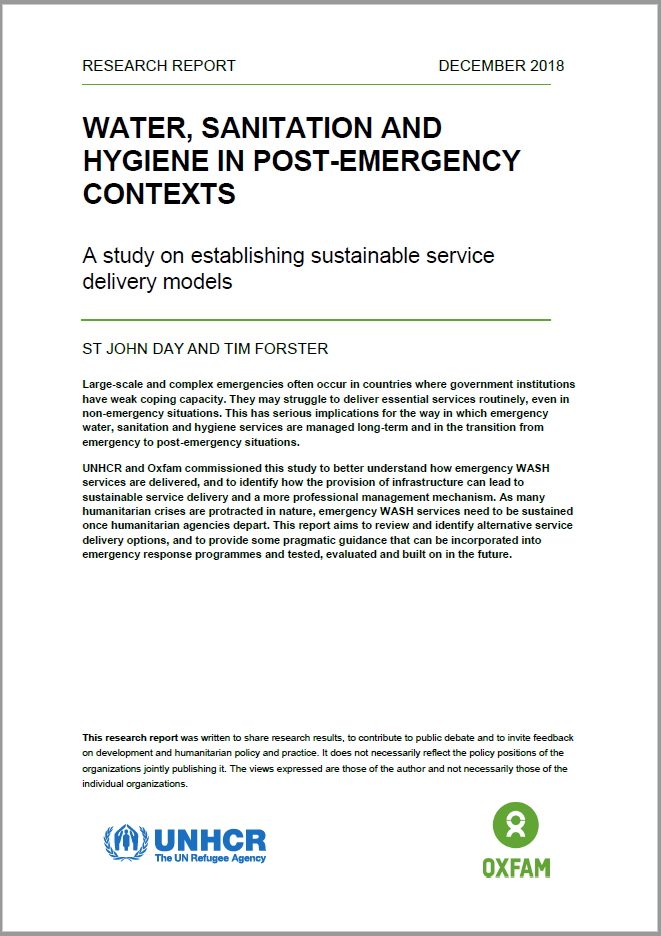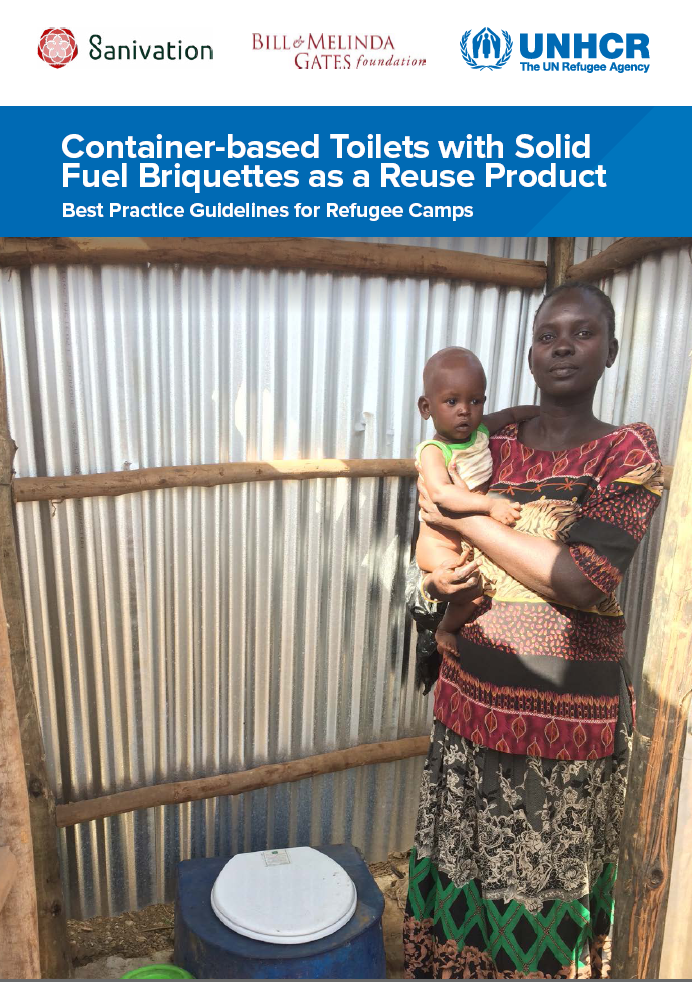This document covers analysis from the piloting of a business model involving container-based sanitation and a domestic energy reuse product.
Archives
Waste-to-Value Sanitation in Kakuma Refugee Camp

Technical WASH Guidance for COVID-19 Preparedness and Response (UNHCR, 2020)

The following is a breakdown of key WASH guidance for COVID-19 preparedness and response to support regional and country operations in planning and resource mobilization. These are based on WHO technical guidelines and UNHCR guidance for operations and where relevant operation or site level outbreak preparedness and response plans.
- Tags: Coronavirus and COVID-19.
WASH and Energy Checklist for Health Facilities (UNHCR, 2020)

A WASH and Energy Checklist for rapid assessments of Health Facilities in refugee contexts.
- Tags: Handwashing with Soap and Handwashing with Soap.
WASH in Health Care Facilities in Emergencies (WHO, 2011)

This document contains recommendations for setting minimum Water, Sanitation and Hygiene (WASH) standards in health-care facilities in emergencies in order to provide an adequate and safe level of health-care in addition to minimizing the risk of health-care facility related infection for patients, staff and carers.
- Tags: Disease Vector Control and Disease Vector Control.
Essential Environmental Health Standards in Health Care (WHO, 2008)

This document provides guidance on essential environmental health standards required for health care in medium- and low-resource countries and support the development and implementation of national policies. These guidelines have been written for use by health managers and planners, architects, urban planners, water and sanitation staff, clinical and nursing staff, carers and other health-care providers, and health promoters.
- Tags: Drainage, Drainage, Drainage, Medical Waste Management, Medical Waste Management, Medical Waste Management, Public Health, Public Health, Public Health, Public Health, Solid Waste Management, Solid Waste Management, Solid Waste Management, WASH in Health Care Facilities, WASH in Health Care Facilities, and WASH in Health Care Facilities. Organisations: WHO and WHO. Categories: WASH Indicators and Standards and WASH Indicators and Standards.
Water, Sanitation and Hygiene in Post-Emergency Contexts (UNHCR, OXFAM GB)

UNHCR and Oxfam commissioned this study to better understand how emergency WASH services are delivered, and to identify how the provision of infrastructure can lead to sustainable service delivery and a more professional management mechanism. As many humanitarian crises are protracted in nature, emergency WASH services need to be sustained once humanitarian agencies depart. This report aims to review and identify alternative service delivery options, and to provide some pragmatic guidance that can be incorporated into emergency response programmes and tested, evaluated and built on in the future.
- Tags: Cross Cutting, Cross Cutting, Cross Cutting, and Humanitarian to Development. Categories: WASH Research Documents and WASH Research Documents.
Container-based Toilets with Solid Fuel Briquettes Guidelines

These Best Practice Guidelines were developed by Sanivation, a private sanitation company based in Kenya under UNHCR’s “Waste to Value” Project, funded by the Bill and Melinda Gates Foundation. The Guidelines are based on ongoing operational research in Kakuma Refugee Camp in partnership with UNHCR and the Norwegian Refugee Council (NRC), and will be update at the end of the Project in 2019.
- Organisations: Sanivation and Sanivation.
Tiger Worm Toilet Guidelines

These Best Practice Guidelines were developed by Oxfam under UNHCR’s “Waste to Value” Project, funded by the Bill and Melinda Gates Foundation. The Guidelines are based on operational research conducted in 2016 and 2017 in Jewi Refugee Camp in Ethiopia, where the Tiger Worm Toilets remain in operation and under regular monitoring.
- Tags: Value for Money. Categories: WASH Policy Guidelines, WASH Policy Guidelines, WASH Policy Guidelines, WASH Policy Guidelines, and WASH Policy Guidelines.
UNHCR WASH Equipment Specifications

This WASH Equipment Specifications Catalogue has been produced by UNHCR’s WASH and Procurement Departments to improve the acquisition and effective procurement of WASH relief items.
The catalogue includes specifications and quality requirements for standard WASH equipment items such as pumps, tapstands, water tanks and water testing equipment.
UNHCR Urine Diverting Dry Toilet (UDDT) Standard Operating Procedures

Double vault Urine Diversion Dry Toilets (UDDT) can be used as an alternative to pit latrines in refugee camps. They utilise two chambers for faeces, one of which is in use whilst the other is full and drying so that it can be safely disposed of after an appropriate period of time.
These Standard Operating Procedures (SOPs) were developed by Oxfam under UNHCR’s “Waste to Value” Project, which was funded by the Bill and Melinda Gates Foundation. They are largely based on UDDTs developed under the Waste to Value Project in Ethiopia.
- Locations: Ethiopia. Languages: English, English, English, English, English, English, English, English, English, and English. Organisations: Bill and Melinda Gates Foundation, Bill and Melinda Gates Foundation, Bill and Melinda Gates Foundation, Bill and Melinda Gates Foundation, OXFAM GB, OXFAM GB, OXFAM GB, UNHCR, UNHCR, UNHCR, UNHCR, UNHCR, UNHCR, UNHCR, and UNHCR. DatabaseDocTypes: WASH Design Documentation. Categories: WASH Design Guidelines, WASH Guidelines, WASH Guidelines, WASH Guidelines, WASH Guidelines, WASH Operational Guidelines, WASH Reference Documents, WASH Reference Documents, WASH Reference Documents, WASH Reference Documents, WASH Reference Documents, WASH Reference Documents, WASH Reference Documents, WASH Reference Documents, WASH Reference Documents, and WASH Technical Designs.
